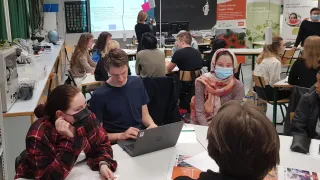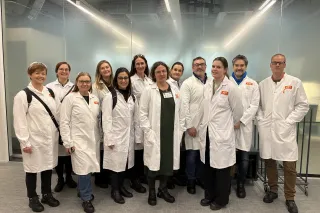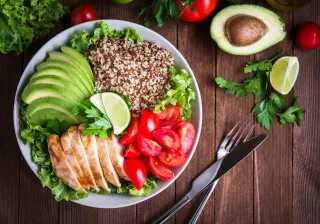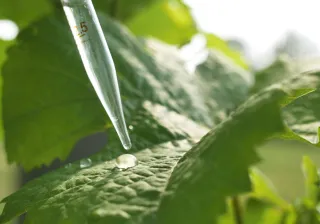“Mikko is a 40-year-old teacher. Mikko's family lives in a detached house on the roof of which they grow vegetables. From there, he fetches a self-grown tomato for breakfast, which he chops on top of the sandwich. The bread topping also consists of an egg that is made in a bioreactor. At the lunch break, he goes with his students to the school canteen. Food is pre-packaged according to the specific needs of each student, minimizing food waste. Some of the school food has been produced in the school yard, and students have been involved in growing it. The rest of the food is produced in bioreactors.”
This is how the students of Otaniemi high school in Espoo and Maunula Secondary School and Helsinki School of Mathematics, in the Helsinki metropolitan area, described the future of food in 2100. The future scenarios written by the high school students clearly showed concern for the state of the environment, but also a belief that problems could be solved. Delays and problems when introducing new technologies were highlighted in some of the stories. The needed changes in the systems were only made when it was absolutely necessary, and this could lead to very unfortunate consequences. Some, on the other hand, believed that new technologies would allow the 2100 dining table to continue to have a diverse range of different foods, partially or completely produced in bioreactors. High school students were openly curious about the new technologies and the opportunities they brought. The bioreactors were in the stories not only in mass production, but also in the families ’own use, like coffee makers are today.
The aim of the workshops organized by VTT Technical Research Centre of Finland was to get students to think about our food system: how food is produced and consumed now and how in the future. The students worked on scenarios of alternative futures beyond 80 years when they themselves are almost hundred years old and their children have already retired. As tools to support the work, the students used future cards, which were applied guide them to think things like urbanization, circular economy, cellular agriculture, genetic engineering, and local vs. global food production.
"The workshop provided variation to the lessons and it motivated both students and teachers. Students became acquainted with the food production methods of the future and their environmental impact." says Elisa Mehtälä, a biology teacher at Maunula Secondary School and Helsinki School of Mathematics.
The experience at Otaniemi High School was very similar. “The researchers' expert presentations and interesting preliminary materials drove the students into amazing imaginations. The scenarios were captivating and in them even a sparkle of humour was found,” says biology teacher Kirsi Haapamäki.
In the workshops, the discussion was lively both in the groups and during the presentations of the group works. Students also asked a lot of additional questions.
“It was really awesome to note that the topic was of interest to students. The discussions revealed that young people expect new technologies to develop relatively late in the 2050s and to bring solutions to food production problems only then,” comments project manager Anneli Ritala, VTT.
“This observation is important in the sense that there is a clear need for discussion on the topic and similar future workshops. Young people need to be educated about the development of technologies to create hope, especially when climate change and other problems related to food production are perceived as very distressing.”
The workshops were part of EIT-Food's Annual Food Agenda project.
The Annual Food Agenda
The Annual Food Agenda is a communication project under the support of EIT Food. the Annual Food Agenda Education toolkit contains food-related materials for schoolchildren of all ages (www.annualfoodagenda.com). FUTURE CARDS - FOOD PRODUCTION IN 2100 can also be found on the project website.
EIT Food is Europe’s leading food innovation initiative, working to make the food system more sustainable, healthy and trusted. The initiative is made up of a consortium of key industry players, startups, research centres and universities from across Europe. It is one of eight Innovation Communities established by the European Institute for Innovation & Technology (EIT), an independent EU body set up in 2008 to drive innovation and entrepreneurship across Europe.”









